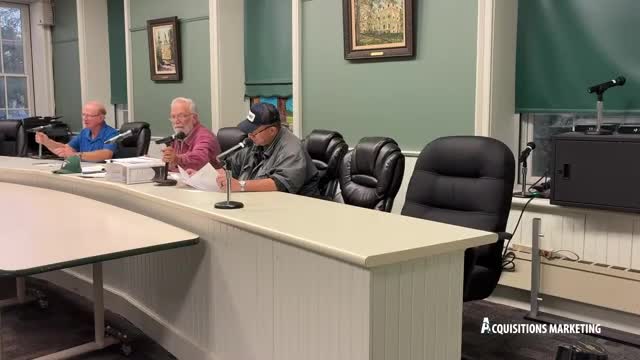Planning reviewers say IWS DEIS answers many questions but flag runoff, leachate and off-site truck storage
Get AI-powered insights, summaries, and transcripts
Subscribe
Summary
Reviewers told the town board the second-round draft environmental impact statement (DEIS) from IWS addresses many earlier information requests but raised outstanding concerns about stormwater runoff to a neighboring property, leachate handling and the company's use of leased/adjacent land for waste storage.
Planning board reviewers told the town board they believe the Integrated Waste Services (IWS) second-round draft environmental impact statement (DEIS) largely responded to earlier information requests but left material questions about runoff, leachate disposal and off-site vehicle storage unresolved.
Reviewers said the DEIS shows geotechnical borings and laboratory analyses that the report says found no contamination above applicable cleanup objectives; the reviewers agreed that the sampling appears to have been performed and reported, but said the town should seek an independent technical review. They also noted the DEIS explains leachate collection and off-site disposal but does not clearly identify which licensed wastewater treatment facility will receive trucked leachate.
The DEIS describes stormwater and leachate flows from the IWS site that, according to the report and reviewers'analysis, route in part onto the neighboring property known as Amy's Kitchen. Reviewers warned that at least two flow paths were identified: sheet flow toward the northeast of the site and a 12-inch culvert that discharges onto Amy's parcel. Board members said that past operations have produced visible leachate on Hartley Road after rain, and expressed concern about additional runoff when the proposed building footprint is enlarged.
Reviewers asked for clearer engineering solutions rather than descriptions of how runoff will move off site. They recommended that the town require IWS to provide either a treatment plan, a containment/holding system sized for a major runoff or firefighting event, or evidence that a licensed contractor and a receiving treatment plant are in place for all off-site leachate removals. The DEIS notes the facility removed about 78,600 gallons of leachate for off-site disposal in 2024; reviewers said they could not find a specific, named receiving plant in the materials.
The committee also raised land-use compliance concerns. Reviewers reported that IWS acknowledged using leased adjacent acreage beyond its permitted footprint to stage trucks and stored material. Members said town code limits the amount of land in the town that may be used for solid waste purposes, and that storage of loaded municipal solid waste (MSW) vehicles on leased properties without explicit town approval could violate local rules. The DEIS and accompanying materials indicate trucks are sometimes staged on neighboring parcels; reviewers pressed the town to confirm whether those leased areas are allowable under local permits and whether the site is properly fenced as required by state and local codes.
Traffic and vehicle operations were another area of concern. The DEIS lists an average of 142 truck movements per day (113 inbound, 29 outbound). Reviewers said tire- and truck-wash protocols, loading-area controls and pavement cleaning should be clarified and, where appropriate, incorporated into permit conditions so that contaminated water from equipment or truck washing is routed to the facility's leachate collection system rather than leaving the property.
The planning reviewers framed their role narrowly: their recommendation to the town board was whether the DEIS is complete for public review, not whether the project should be approved. Several members said the DEIS may be "complete" in the sense that the company attempted to answer the prior comments, while the substance and adequacy of those answers would be tested during the public comment and subsequent review phases. The committee suggested the town enlist subject-matter experts (soil remediation, geotechnical, and wastewater treatment) to vet sampling methods, analytical results and leachate disposal plans before the town board acts.
Next steps the committee identified include asking IWS to: name the licensed facility that will accept leachate; provide engineering plans or a contingency design to contain and treat large volumes of runoff or firefighting water; document any off-site leased areas used for waste storage or truck staging and show legal authorization for those uses; and confirm fencing or other site security that local and state codes require.
The planning reviewers did not take a formal vote at the meeting; instead they planned to forward their completeness recommendation and any technical questions to the town board for the board's upcoming agenda and public hearing process.
